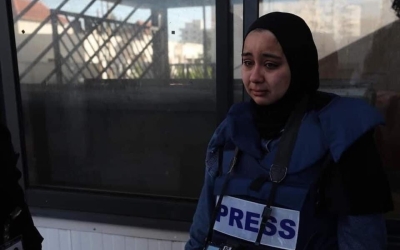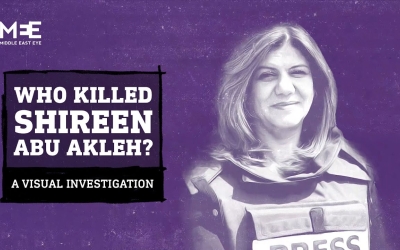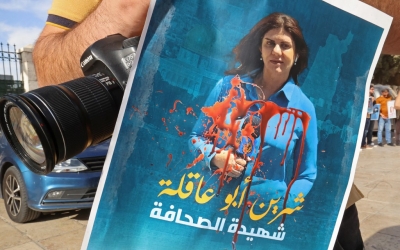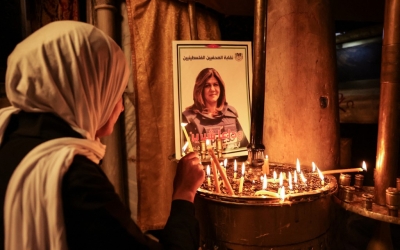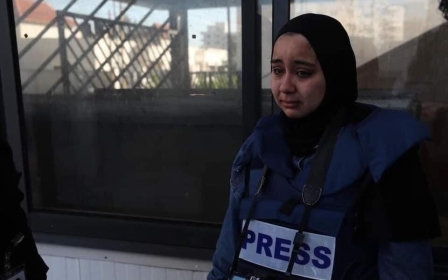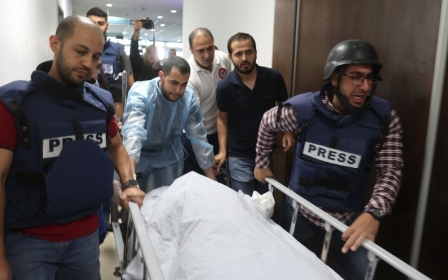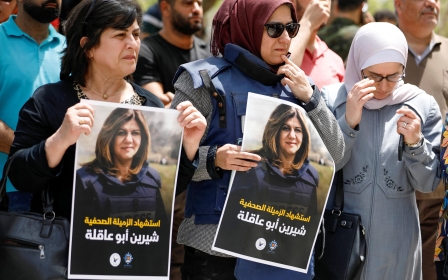Shireen Abu Akleh: How Western media failed slain Palestinian journalist
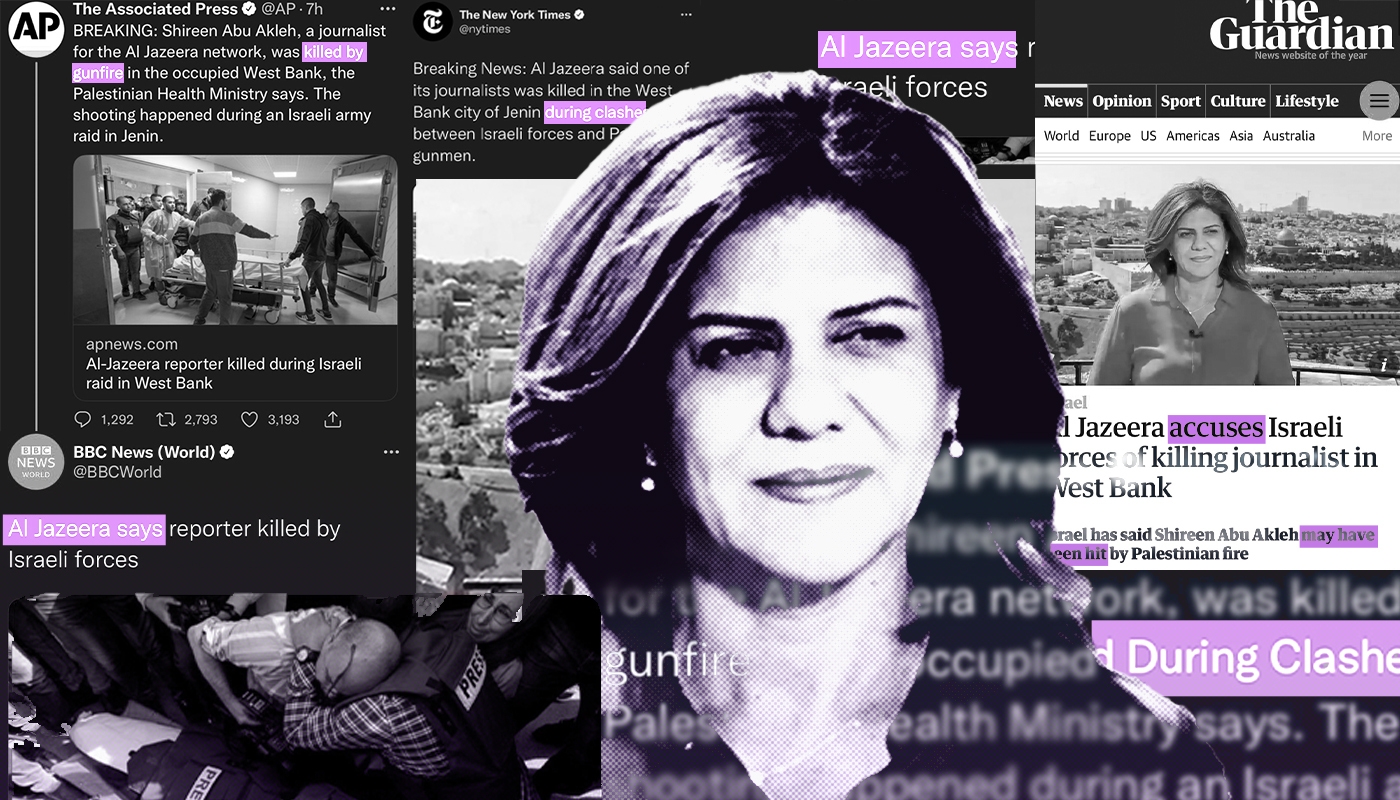
Early on Wednesday morning, Israeli forces shot and killed Shireen Abu Akleh, the veteran Palestinian journalist and senior correspondent with Al Jazeera Arabic, during a raid just outside a refugee camp in the occupied West Bank.
Abu Akleh, 51, was shot by a sniper as she attempted to cover the raid in Jenin, an incident her employer, the Qatar-based Al Jazeera network described as "a blatant murder, violating international laws and norms". At the time of the shooting, Akleh was wearing a vest that clearly identified her as a member of the press.
The incident, which also resulted in her colleague Ali Asmoadi being shot in the back, was witnessed by several other journalists including Middle East Eye contributor Shatha Hanaysha.
Akleh was transferred to Ibn Sina hospital in Jenin where she was pronounced dead.
As news of the shooting spread, the Israeli government began unrolling a series of statements and videos that contradicted events leading up to her death.
New MEE newsletter: Jerusalem Dispatch
Sign up to get the latest insights and analysis on Israel-Palestine, alongside Turkey Unpacked and other MEE newsletters
Israel's ministry of foreign affairs released a video in which it claimed that "Palestinian terrorists, firing indiscriminately, are likely to have hit Al Jazeera journalist Shireen Abu Aqla".
Exactly an hour later after that statement was issued, the Israeli government released a statement on behalf of Prime Minister Naftali Bennett in which his office attempted to further diffuse responsibility that added a cloud of uncertainty over the killing.
"According to the information we have gathered, it appears likely that armed Palestinians - who were firing indiscriminately at the time - were responsible for the unfortunate death of the journalist," Bennett was quoted as saying.
Meanwhile, Hananya Naftali, an Israeli influencer who works with former Israeli Prime Minister Benjamin Netanyahu, also released a flurry of social media posts in which he falsely claimed that Abu Akleh had been buried almost immediately "because the Palestinian Authority wants to conceal the truth".
Thirty minutes later, he performed a u-turn on this claim, too. Abu Akleh is scheduled to be buried on Friday.
It wasn't long before mainstream western media news outlets began presenting the story as unclear.
Huwaida Arraf, long-time Palestinian-American activist and congressional nominee, told Middle East Eye that none of this was surprising.
"Israel's propaganda machine plays a big role here. They deliberately muddle facts and present misinformation that the mainstream media faithfully repeats," she said.
'Clashes' and 'Palestinian bullets'
In its depiction of Abu Akleh's murder, The Guardian described Al Jazeera as having "accused" Israel of killing one of its journalists, immediately balancing this claim by platforming the Israeli position that the journalist "may have been hit by Palestinian fire".
Whereas Al Jazeera's "accusation" was backed by witness testimony, the Israeli retort that it took place in the middle of clashes or a result of Palestinian cross fire came without any evidence.
Likewise, The Associated Press wrote that Abu Akleh had been "killed by gunfire", purposefully obscuring the strong allegation that it was an Israeli sniper who had killed her.
The story also echoed Israeli talking points of "chaotic circumstances", relegating Al Jazeera's claim of a "targeted assassination" as hyperbole.
But the most alarming coverage came from the The New York Times which not only followed Israel's official narrative, it also mischaracterised Al Jazeera's official statement.
"Al Jazeera said one of its journalists was killed in the West Bank city of Jenin during clashes between Israeli forces and Palestinian gunmen," the Times wrote. Al Jazeera did not mention clashes in its statement.
The New York Times issued a correction later on Wednesday, claiming to have "misstated" Al Jazeera's comments.
"[Al Jazeera] said she was killed by Israeli forces in the West Bank city of Jenin; it did not say she was killed during clashes between Israeli forces and Palestinian gunmen," the correction at the bottom of the story read.
"By the time corrections are made, people are no longer paying attention. In this case, plenty of journalists who were there when Shireen was killed, stated in no uncertain terms that it was the Israelis who shot at them," Arraf said.
And even though the Times issued a correction, the erroneous reference to clashes between Israeli forces and Palestinian fighters remained in the story.
The Times only removed its attribution to Al Jazeera. In fact, by Thursday afternoon the story still claimed that there remained uncertainty over the details around the event, and that clashes were ongoing when the shooting took place.
"The circumstances surrounding the shooting of the journalist, Shireen Abu Akleh, a Palestinian American, were not immediately clear but it happened as clashes between the Israeli military and Palestinian gunmen took place in the city," the Times wrote.
The New York Times did not respond to MEE's response for clarity or comment by the time of publication.
Outrage towards mainstream coverage
The mainstream media's coverage of Abu Akleh's murder has left Palestinian rights activists in the United States aggrieved.
Much of the outrage is rooted in the knowledge that Israeli violence continues unabated with little recourse for justice.
According to Reporters Without Borders, at least 144 Palestinian journalists have been wounded by Israeli forces across the Gaza Strip, West Bank and East Jerusalem since 2018.
In May 2021, Israeli air strikes on Gaza destroyed Al Jalaa Tower, which housed a number of media offices used by outlets including MEE, Al Jazeera, the Associated Press, and other local media organisations.
In late April 2022, a formal complaint was filed with the International Criminal Court (ICC), alleging that Israel's "systematic targeting" of Palestinian journalists and its failure to investigate their killings amounts to war crimes.
"The hypocrisy of mainstream media coverage was on full display when journalists were positively covering Ukrainian civilians' making and using Molotov cocktails as a form of brave resistance. Israeli soldiers shoot Palestinian kids dead for holding a Molotov cocktail and you don't hear a peep from the same journalists," Arraf said.
Even though the Israeli military has yet to conclude its investigation, only publishing initial findings of its probe, the Israeli army has continued to push the message that there are indications that Abu Akleh was killed by Palestinian fire.
An unnamed Israeli official told Haaretz that this "PR blitz" has already influenced leading news organisations including The Associated Press, Sky News, the BBC, and AFP.
The official said that these agencies - which initially reported that Abu Akleh had been killed by Israeli fire - were now reporting that the circumstances of her death are under investigation.
'Parroting Israeli talking points'
Nerdeen Kiswani, co-chair of Within Our Lifetime, a Palestinian American youth-led grassroots organisation based in New York City, described the mainstream media's coverage as "disgusting, painful and hurtful".
"You know, they're not even saying who killed her. They're just saying she died, you know, or that she got shot and they're not really ascribing blame to the perpetrators in this situation," Kiswani told MEE.
"And that is devastating because she spent her whole life uncovering Israeli violence and Israeli colonialism against Palestinian people. And then when they take away her life, the mainstream media won't even do the due diligence of simply reporting the fact on who killed her."
In response to the Times' coverage, Jewish Voice for Peace (JVP), an anti-Zionist organisation opposed to Israeli occupation, called on its members to write to newspaper's editors to demand better coverage.
"Instead of reporting the facts – as confirmed by other journalists present at the scene, by video footage and by rights groups like B’Tselem – western media has simply parroted talking points from the Israeli military," Sonya E Meyerson-Knox, communications director of JVP, told MEE.
"And so, instead of describing how an Israeli military sniper fired at the head of a clearly identified journalist, we have reports of "unclear circumstances" and no attribution of who actually killed Shireen. Biased reporting like this isn’t just racist, it’s broadcasting free propaganda for an apartheid regime."
Others like Azadeh Shahshahani, director of Project South, said that if media coverage continued in this vein, it "would make them no less than complicit in covering up war crimes and crimes against humanity."
"As we have seen with the war on Ukraine, media coverage is instrumental in shaping public opinion and guiding public policy. It is incumbent upon media outlets to start telling the truth about the atrocities of Israeli Apartheid," Shahshahani said.
Several Palestinian organisations have said they would hold a rally on Friday evening outside the New York Times' headquarters in Manhattan. Within our Lifetime said they will hold a vigil for Abu Akleh at the annual Nakba rally in Brooklyn on Sunday.
This article is available in French on Middle East Eye French edition.
Middle East Eye delivers independent and unrivalled coverage and analysis of the Middle East, North Africa and beyond. To learn more about republishing this content and the associated fees, please fill out this form. More about MEE can be found here.


